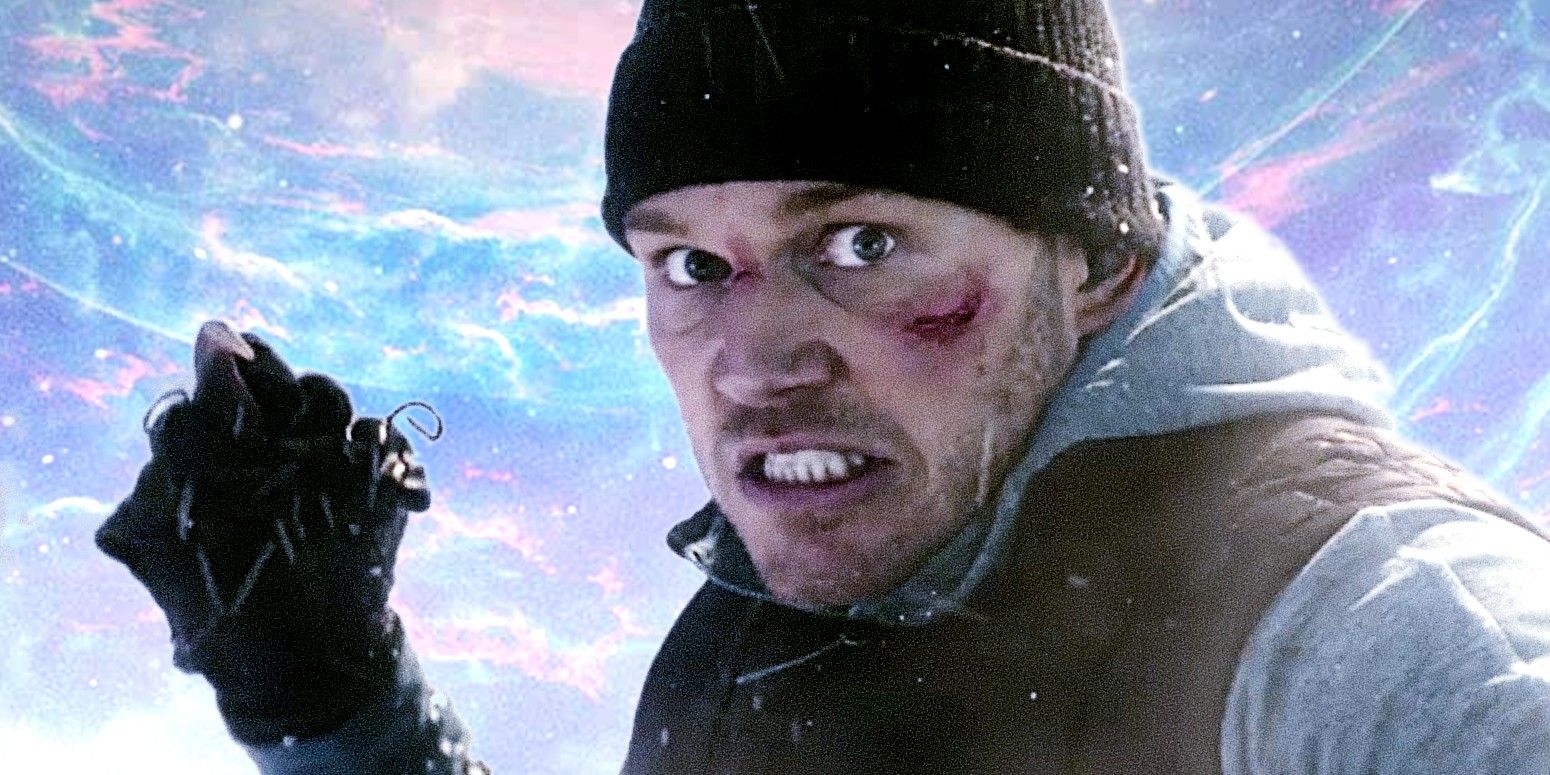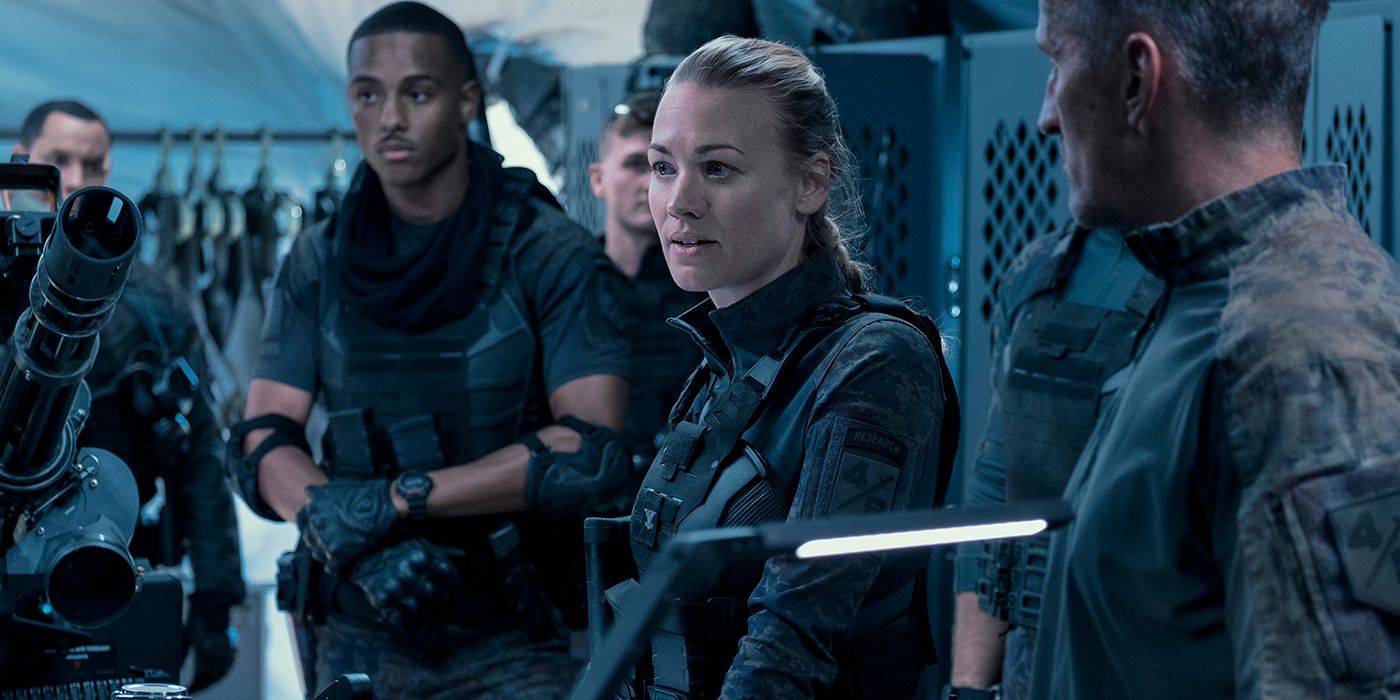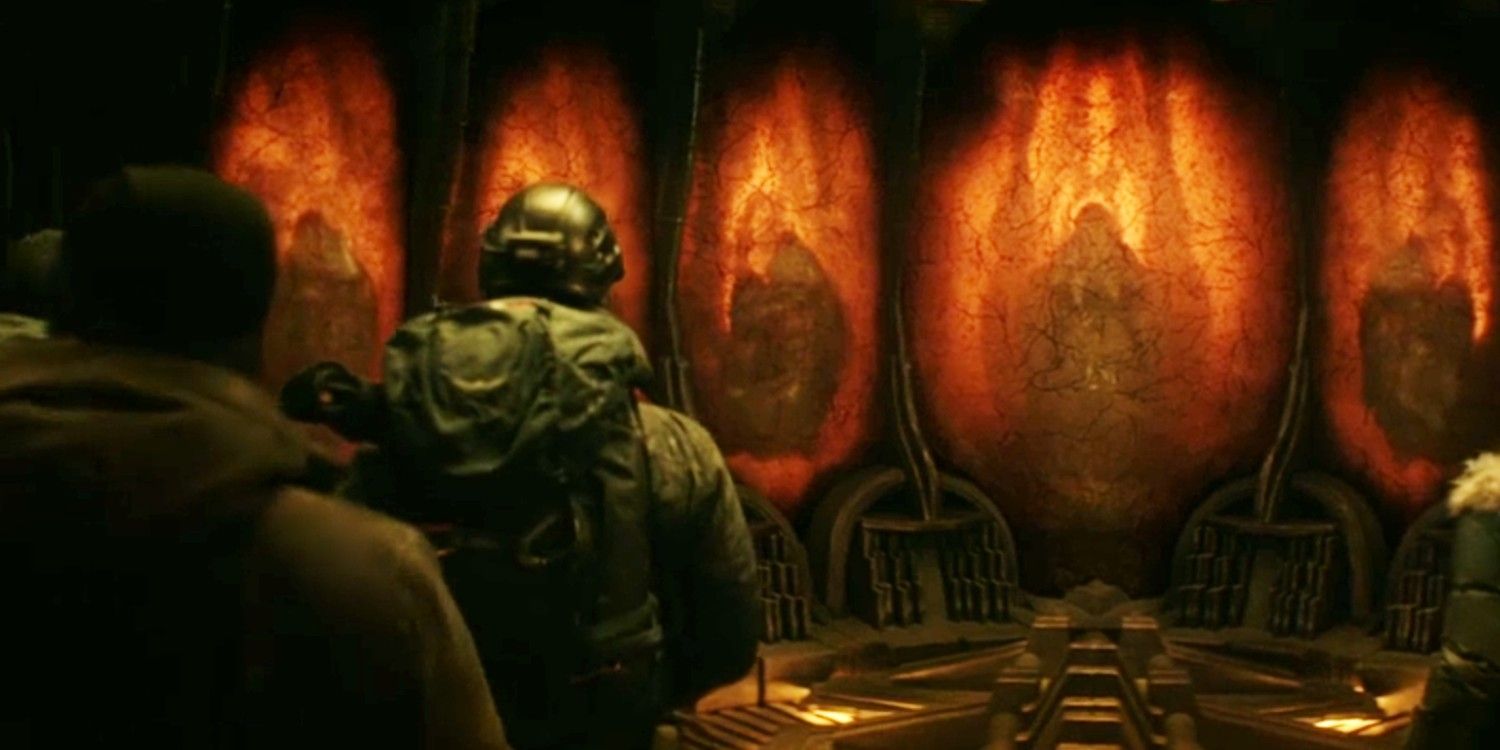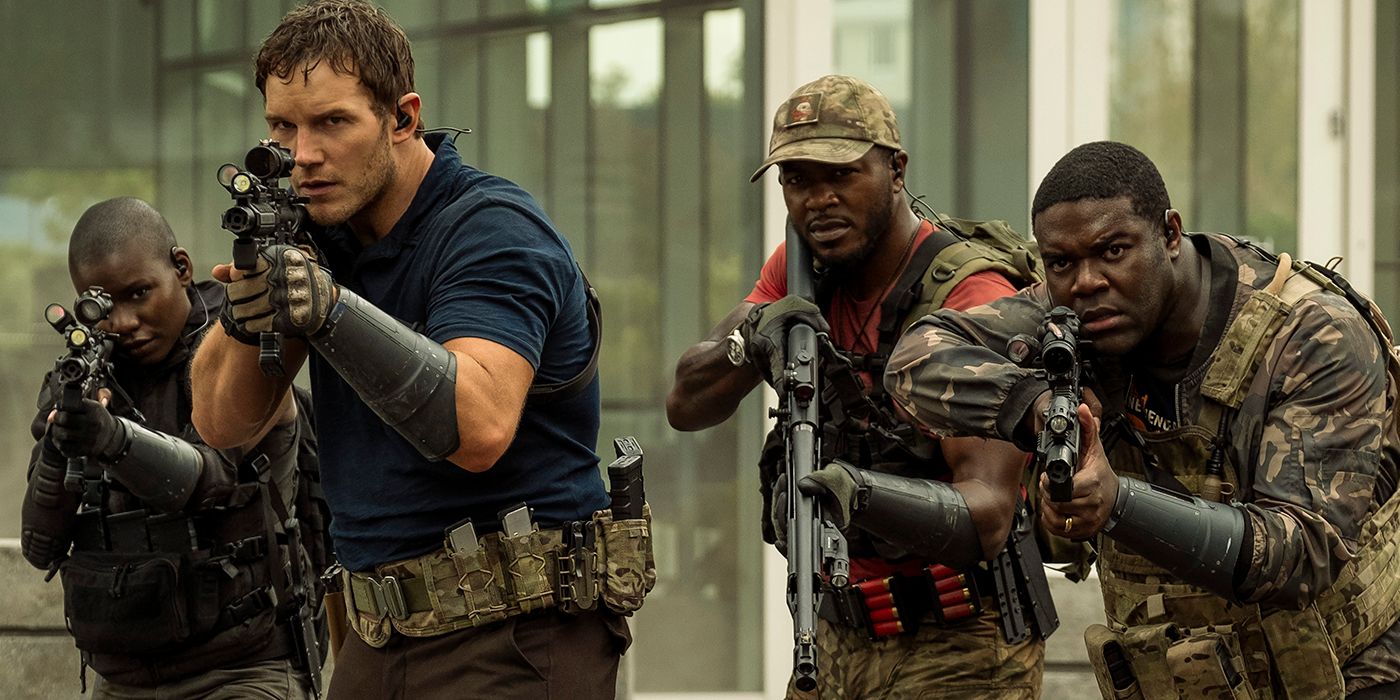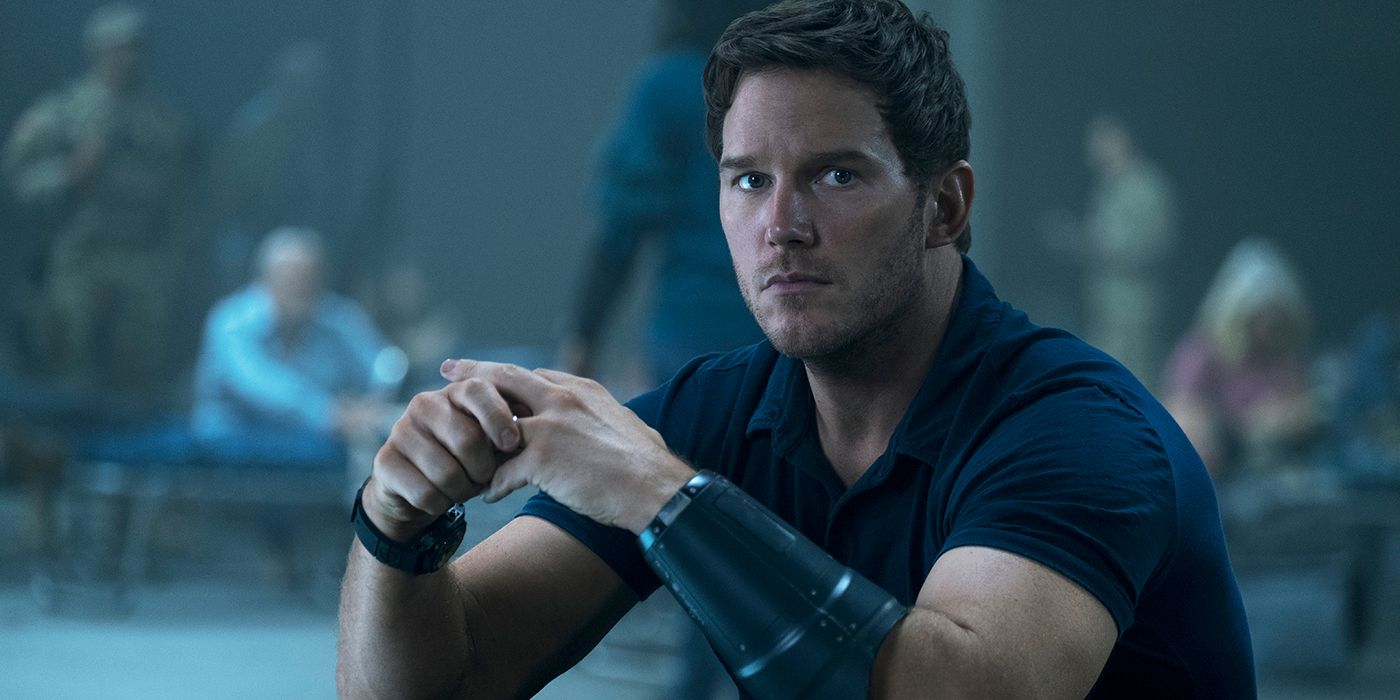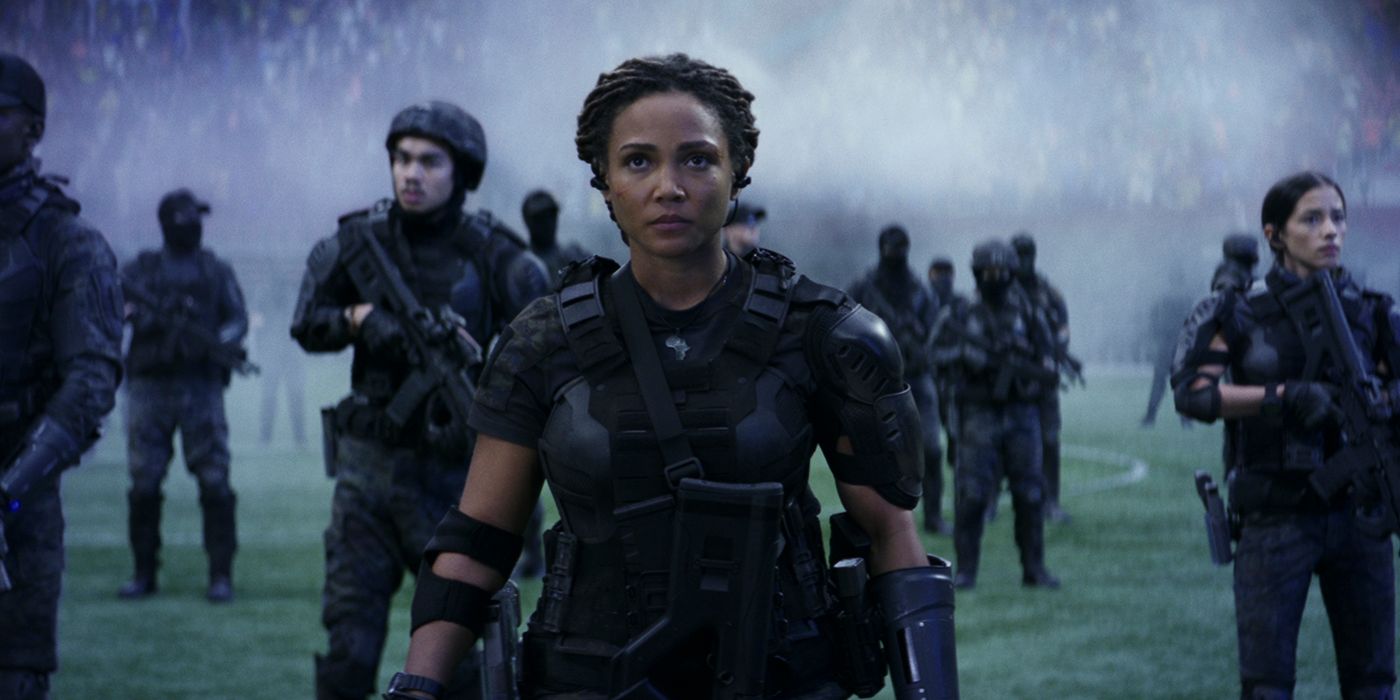In Amazon Prime's new action sci-fi movie The Tomorrow War, Chris Pratt plays a former soldier who finds himself back in combat when he's sent to the future to fight a ruthless army of aliens from wiping out humanity. It's not until Dan Forester meets a future version of his daughter, Muri (Yvonna Strahovski), that he realizes she never intended to save the future, but to change it.
Directed by Chris McKay, The Tomorrow War begins with several dozen soldiers from the future transporting themselves to the year 2022. Led by Lt. Hart (Jasmine Mathews), they explain that they come from the year 2051, where only 500,000 humans are left alive on the planet, and their numbers are dwindling fast. To save mankind from extinction, civilians from the present day are drafted as soldiers in this future war and sent through a wormhole in time to do seven-day tours of action. Only 30% of those drafted come back alive, and of those many are left with amputated limbs and severe PTSD.
When Dan's time comes to be sent to the future, he discovers that Muri is leading the research arm of the military and has a plan to stop the aliens - called "Whitespikes" because of their ability to fire lethal spikes in combat - by creating a toxin that disintegrates them. But while there is still a chance to save mankind, the only way to do it is by making sure this apocalyptic war never happens in the first place.
What Future Muri's Plan Was
The soldiers who travelled back in time to recruit people from 2022 for the war claimed that they need fighters in order to win the war so that they can start to rebuild civilization. However, the truth is that Muri already knew at that point that the war was lost, and her intention was never to save the remains of humanity in her own world. The real plan, and the real cause for which all the drafted soldiers were fighting, was simply to buy enough time to create a toxin capable of killing the female Whitespike, so that the toxin could then be sent back into the past to prevent the Whitespikes from overrunning the planet in the first place. Muri tells Dan that she and all the other people in 2051 are living on "borrowed time," and that time has been heavily paid for in blood.
Muri seems to be alone in knowing that this was the real plan, because the morale of the troops still left alive in 2051 would undoubtedly be affected if they knew there was no hope for them except having their timeline erased. However, the fighters recruited from the 2020s were never exactly lied to. They were told that they needed to fight in order to save their children and their grandchildren, and their sacrifices bought Muri enough time to create the toxin and send it back. In that sense, she was able to save not only the very few children and grandchildren still left alive in her own timeline, but also the billions of people who had already been killed, by erasing their apocalyptic future and giving them a better one.
Where The Aliens Came From
In The Tomorrow War's original timeline, the aliens suddenly appeared in Northern Russia in 2048 and rapidly spread across the globe from there, eradicating the population to just 500,000 people in the space of three years. It was assumed that the Whitespikes were highly advanced and intelligent, and had landed their ships on Earth so stealthily that no satellites or radar systems were able to detect them. However, this doesn't tally with what's seen of the Whitespikes throughout The Tomorrow War; they don't use weapons or technology, and they overpower humans through sheer brute strength and numbers rather than through strategy and guile. When Dan and the rest of the team finally find the Whitespikes' ship in Russia, this odd contradiction is explained.
The Whitespikes are not an intelligent race, but are biological weapons that were being hauled as cargo by an alien species of higher intelligence and a slightly more humanoid experience. The aliens appear to be intergalactic colonists, who were using the Whitespikes as a means of clearing out existing life forms on planets in order to move on and establish their own species on those planets. Unfortunately for these aliens (and for humanity), they ended up accidentally crashing on Earth. Dan's ancient volcano-obsessed student, Martin (Seth Schenall), explains that the ash on the claws of the Whitespikes is from the 946 A.D. eruption of Paektu Mountain, known as the Millennium Eruption, which was powerful enough to scatter ash as far as Northern Russia. This means that the aliens crashed on Earth more than a thousand years ago, and the Whitespikes have lain dormant in the ice since then.
The emergence of the Whitespikes is the result of climate change and the melting of the polar ice caps, which by 2048 had uncovered the crashed ship in Northern Russia. The Whitespikes were (unlike the the aliens flying the ship) being held in advanced cryogenic containment that had allowed them to survive, but when the ice melted they may have been disturbed by predators venturing into the ship, or by the ship itself shifting. When some of the Whitespikes are injected with the toxin and die, the noise of their deaths is all it takes to wake up the others, so presumably something similar happened in the original timeline. By getting to the Whitespikes early, destroying the colony onboard the ship and killing the queen, Dan wipes the apocalyptic future from the timeline and makes a better future possible.
Does The Tomorrow War's Ending Create A Paradox?
The Tomorrow War's ending creates a classic time travel problem known as the grandfather paradox. The name is based on the example of a person travelling back in time to kill their own grandfather, which would prevent them from ever being born, and therefore prevent them from going back in time to commit the murder, which means their grandfather would survive, which means that they would be born after all, and would be able to travel back in time to kill him etc. At first it appears that the future recruiters who show up in The Tomorrow War are taking steps to avoid the grandfather paradox. There's a rule that only people who are known to have died before the year 2051 are drafted into the war. While it's not explicitly stated, it would make sense if they also avoided drafting people who were destined to have another child, to ensure that those children were still born.
The reveal of Muri's true plan and Dan's changing of the timeline throws that out of the window, however, and creates a new problem. Because the apocalyptic timeline has been erased, the original sequence of events that led to soldiers being sent back to warn of the coming disaster will no longer happen. By erasing the circumstances that led to the war, Dan has also erased the circumstances that led to the creation of the Whitespike toxin and his own foreknowledge of the alien attack. The Tomorrow War wisely avoids raising the issue of this paradox or the other complexities of theoretical travel, and instead treats Dan's preemptive defeat of the Whitespikes as a straightforward victory. Still, it's a question that may nag at viewers after the movie ends.
Will Dan Still Die In Seven Years?
In the original timeline, Dan and Emmy (Betty Gilpin) separate when Muri is 12 years old and divorce when she is 14, and Dan then dies in a car accident in 2030, when Muri is just 16 years old. Though the older Muri doesn't go into the details of why Dan left his family, the seeds of the original timeline are sown in The Tomorrow War's opening sequence. Dan misses out on a job he desperately wanted, and lashes out by kicking one of the wheels off his bin, revealing a temper that could end up proving lethal to his marriage. He also still has a very poor relationship with his own father, James Forester (J.K. Simmons), who walked out on Dan when he was a child. Though Dan appears to be a good husband and loving father in 2022, his career frustrations and his unresolved issues could have soured over time, creating the circumstances that led to his divorce and, eventually, his death.
Now that Dan has been forewarned of the original circumstances of his death, and experienced firsthand the painful loss of his daughter in the future, it seems unlikely that things will play out the same way that the originally did. After all, he is now recognized as a hero and savior of Earth, and at the end of The Tomorrow War he has begun to repair his relationship with his own father. Since he died as the result of a car accident, rather than as a result of cancer or an inherited illness, even the smallest change to his future could ensure that the car accident will never happen and he will instead have a chance at a long life. The same goes for the other draftees who survived the war, since they were all told the date and circumstances of their deaths, and therefore can avoid them if possible.
The Real Meaning Of The Tomorrow War's Ending
The Tomorrow War is largely, and at times explicitly, an allegory for the impact of climate change on the children and grandchildren of the current generation. In her opening message to the people of 2022, Lt. Hart says that they are calling on their parents and grandparents to act now in order to save them. And when Dan arrives in 2051, it becomes clear that at this point it is already too late to save mankind; nothing that they do in 2051 can prevent their extinction, because they needed to have acted decades ago. While many people from the 2020s are willing to take action, others protest the draft by arguing that the war of 2051 is not their war, and therefore they shouldn't have to deal with it. The connection between the melting of the polar ice caps and the release of the Whitespikes elevates this subtext to text.
This greater meaning of the story also dovetails with The Tomorrow War's family drama. Just as Muri and the other survivors in 2051 reached out and asked for help, Dan's relationship with his father only begins to heal when he's able to put the pain of the past behind him and ask James to help him. After they destroy the Whitespikes, the father and son return home and James is introduced to his granddaughter for the first time. This final scene captures the message of the rest of the movie: it will be too late to change things in the future, but it's not too late yet.

